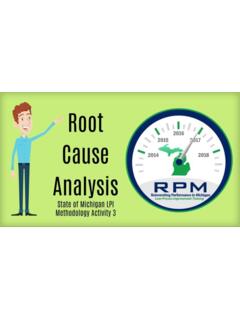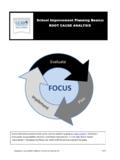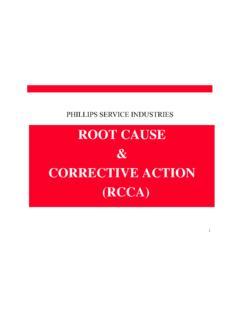Transcription of ROOT CAUSE ANALYSIS LABORATORIES
1 "Managing Risk, Enhancing Culture and mproving Performance.". root CAUSE ANALYSIS LABORATORIES WORKSHOP CAPA. root CAUSE Analysisis Rootcause ANALYSIS is a completely separate process to incident management and immediate corrective action, although they are often completed in closeproximity. root CAUSE ANALYSIS (RCA) requires the investigator(s) to look beyond the solution to the immediate problem and understand the of non-conformances which sometimes results in them being suspended or test methods being removedfrom accreditation scope. Without an root CAUSE ANALYSIS Workshop methodologies and practicallaboratory related examples of root CAUSE ANALYSIS , laboratory personnel can surely improve their management systemand technical services.
2 Genericproblem solving approaches to identify the technical root CAUSE (the change that has occurred) as well as any systemic root causes (system failuresthat allowed the change to occur).Corrective and / or preventive actions are then taken so that the performance can be restored to its previous,professional level. A control plan is then implemented to prevent the problem from ever returning. P s will learn several root CAUSE ANALYSIS tools that will allow s within their organis . WHO SHOULD ATTEND? This highly prac cal workshop for Laboratory analysts, professionals in Quality,Senior and Middle Level Managers from LABORATORIES of any type and size (QC Labs, Medical/Hospital Labs, Pharmaceu cal and Food industries Labs, Laboratory Technicians, Quality Assurance Managers and Senior Personnel Health and Safety Manager, Supplies Acceptance Labs, In-process Labs.)
3 COURSE OBJECTIVES. Introduc of a logical problem solving process applicable to issues and Detec g Pro ciency Test Failures in Laboratory. non conformi es of all sizes. Iden fy the technical root CAUSE (s) and any systemic root CAUSE (s). To teach the members of this class how to e ec ely analyze problems, preven f recurring failures. determine their root causes and de ne appropriate Correc e Ac Detec f Nonconformity within the Laboratory and being To impart a familiarity with analy cal tools u ed in the determina communicated. of root causes . To ensure all de ciencies in the laboratory's quality system and tes To provide guidance to carry out proper root CAUSE ANALYSIS (RCA) with ac es are documented though its suitable quality tools.
4 Documen g an incident various formats, Excel. (Laboratory Audit Determine whether a root CAUSE ANALYSIS is required. de ciency.). Rela etween process & CAUSE -and-e ect. Correla and regression Risk assessment and failure modes. Iden fy and implement a control plan to assure you do not have this Risk, preven em solving. issue again. Roo g of the sequence of events within the LABORATORIES . Iden fy Appropriate Correc ve Ac on Iden ca on of permanent Any other relevant data or informa for example records, test results, solu informa from sta in the relevant area or complaints). ORGANIZATIONAL IMPACT PERSONAL IMPACT. Improved Performance Focused ac es Improved decision making abili es A new sense of Informed decision-making Improved understanding of the Clarity of vision certainty and Delega and Produc ty maintenance process Understanding of Consequences con dence Elimina f Time-Was g ac es ( CAUSE / E ect) Empowerment and a Improved Maturity results driven focus.
5 root CAUSE ANALYSIS LABORATORIES WORKSHOP CAPA (Corrective Action / Preventive Action). TRAINING METHODOLOGY. The training methodology is inter-active with numerous group exercises. The pace and level of the program is customized to the understanding of the delegates. Participants will learn that problem solving in LABORATORIES is about identifying and eliminating speci c causes . The simple three-step process bene ts people at all levels in an organization (executives to front-line employees) by creating a visual picture of how to prevent past problems for the purpose of improving business performance. This CAUSE Map is a simple, visual tool for capturing these speci c causes and making the information available throughout an organization.
6 MEET YOUR FACILITATOR. Prof JJ ( Koot ) Pieterse Prof JJ ( Koot ) Pieterse's career ineducation and research spans over 32 years and he has developed a niche in root CAUSE ANALYSIS , Lean Laboratory Management, Lean accuracy of laboratory results, Lean manufacturing, lean enterprise and service in South Africa and the world Academic Quali cations: BSc (University of Pretoria), HED. (Universityof Pretoria), NH Dip (Pretoria Technikon), DTE (UNISA), MSc (University of Pretoria), PhD (University of Pretoria. He is a principal lecturer at NMMU Business School, teaching and supervising MBA and Doctoral students. Prof Pieterse was honoured with the annual National Lewerik Award for innovative research in 1990 in the South African defense industry.)
7 His research skills are further supported by his progressive research grant increases from the National Research Foundation. Prof Pieterse has published three books, including Leaning the South African Way and The Lean Service Toolbox: South African Edition, and acted as editor for the text book Implementing Lean in South African Industry. He has presented research papers at several conferences. Areas of expertise/ Specialties: root CAUSE ANALYSIS ,Lean Healthcare,Lean Administration,Implementation Lean. His years of experiencein analytical chemistry and other LABORATORIES come in particularly implementation and awareness training in manufacturing, healthcare and services.
8 Lean, Manufacturing, Automotive Operations Management, Service Quality and Process Improvement. starting Rankine Engineering and later joining Wits University as a lecturer. From 1998 to 2006, he was employed by the Cement and Concrete Institute. He is an author and co-author of more than 40 papers published in accredited journals of science and engineering, international conference proceedings and books. DEAR DELEGATE, LABORATORIES play a very important role in the diagnostic phase of health care, public Health. The performance of any lab is assessed by the turnaround time for giving reliable test results. Any delay in giving test results or unreliable results could have adverse implications.
9 Clinical labs need to invest more on medical and information technology, employ technically quali ed sta , and closely monitor the lab operations in order to meet the increasing expectations from both the clinicians and the patients for a quick turnaround time for reliable test results. Success of labs in future would also increasingly depend on selecting appropriate strategies to provide accurate results and services. It is, therefore, essential to equip lab managers with a basic understanding of challenges in managing the delivery of quality lab services at a ordable prices to patients, desired timely and quality reports to physicians, and ensure adequate nancial returns to the labs.
10 I have benchmarked existing programmes and applied my own experience in laboratory management, operations management. This interactive root CAUSE ANALYSIS for LABORATORIES Workshop will bene t lab owners, lab managers, pathologists, and senior technologists in improving turnaround time, inventory management, operational e ciency, quality practices and sta skills within the lab set up. As it is the notion that improved service quality, e ciencies, and professionalism in lab management will result in better delivering good quality services. We hope to see you there, Best regards, Prof JJ Koot Pieterse. root CAUSE ANALYSIS LABORATORIES WORKSHOP CAPA (Corrective Action / Preventive Action).





